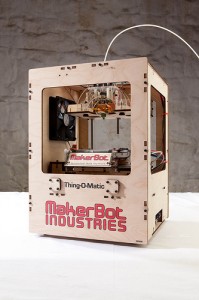 Last week I watched a printer spit out a skull. While I worked on a project at our local TechShop, another member was testing their new Makerbot. Bit by bit, a flawless four inch plastic skull grew before my eyes. I’ve read and thought about 3d printers before, but seeing one in action pushed some buttons about the future of physical items. In particular, I got thinking about what role libraries might play in a world with commonplace 3d printing.
Last week I watched a printer spit out a skull. While I worked on a project at our local TechShop, another member was testing their new Makerbot. Bit by bit, a flawless four inch plastic skull grew before my eyes. I’ve read and thought about 3d printers before, but seeing one in action pushed some buttons about the future of physical items. In particular, I got thinking about what role libraries might play in a world with commonplace 3d printing.
Musician Jonathan Coulton was somehow thinking about the same ideas at the same time. In his reaction to an NPR blog post about young people’s attitudes toward paying for music, Coulton took his analysis in a fascinating direction. He theorized heavily about what might happen to many industries in a post-scarcity world.
What happens when a product can be reproduced by consumers with marginal effort? The music industry and the publishing world are facing early signs of that reality now, but won’t be the last. Coulton goes on to talk about the imminent rise of 3d printers, and the pile of industries they stand ready to disrupt. (There’s an especially fascinating look at a man who printed his own adapters to connect legos, k’nex, and lincoln logs)
Coulton’s post should be required reading for anybody in the library world. While he’s not talking specifically about us, his vision of a post-scarcity world is right up our alley. Libraries have built our business on reducing scarcity – we took a relatively uncommon item like a paper book and made it available to more people than would have access to it otherwise. Now we face the possibility of scarcity itself dropping off a cliff.
Let’s pretend for a minute that the post-scarcity world is upon us. Physical objects which can be easily digitized (books, music, etc) have become virtually obsolete. Most other common 3d goods are now printed at home. What industries or services would be left with viable business models? Here’s a few off the top of my head:
-Support systems for the printers. Raw materials to print with, repairs, etc.
-Food services like restaurants and grocery stores would probably be largely unaffected.
-Other services based around the human body would likely survive relatively unaltered as well. Travel, salons, massages, gyms, etc.
-There will likely be a boom in services related to information management.
I want to focus on that last item a bit, because I think that’s the only place for libraries in a post-scarcity world. If scarcity dies, we would no longer need to be a place to distribute most books, music, or movies. In some ways, that excites me. We’d be able to stop focusing all our efforts on these physical and digital objects! Those objects’ shortcomings have always been something we routed around.
Remove those roadblocks, and we could focus our services on what we’ve always done very well: organizing information and helping people access it. With scarcity gone, the resulting glut of information would be paralyzing if left unsortable and unfiltered.
Libraries which solely manage a flow of non-scarce digital information would admittedly be unrecognizable compared to their current form, but it would still represent a way forward for the profession and a valuable service to society. We might actually be better off than many other industries in the long run, but only if we can convince ourselves to get past the lending of physical objects as the way we justify our collective existence.
OK, Sorry, I went kind of sci-fi crazy there for a minute. I’ll reel it back in: I don’t know if we’ll see society dispense with most scarcity within my lifetime, but I do know that we’ve already seen it decrease in some sectors. Many libraries (both public and academic) face questions from their users here and now: why is a library necessary in an ebook and netflix world? We’re tied to distribution of objects which face an impending removal of scarcity. Can we shift away from them, while we still can?
(Eli Neiburger made very similar points almost two years ago in his “Libraries are Screwed” presentation. It should be required viewing for every librarian everywhere.)
Seeing a 3d printer in action, I noticed something that I’ve never seen mentioned about them before: They’re musical. Think of the noise an old dot-matrix 2d printer made, but somehow more tuned to random notes. So as a musical skull appeared out of thin air in front of my eyes, that’s what triggered the sci-fi thinking. I couldn’t help but wonder about a future in a post-scarcity world. As a group, libraries understandably fight today for ways to lend digital items. But will that even matter in the long term? What if we’re barking up the wrong tree entirely?
The good news is that we stand a chance for survival in a post-scarcity world. The bad news is that we might have to let go of a core part of our identity to get there.


